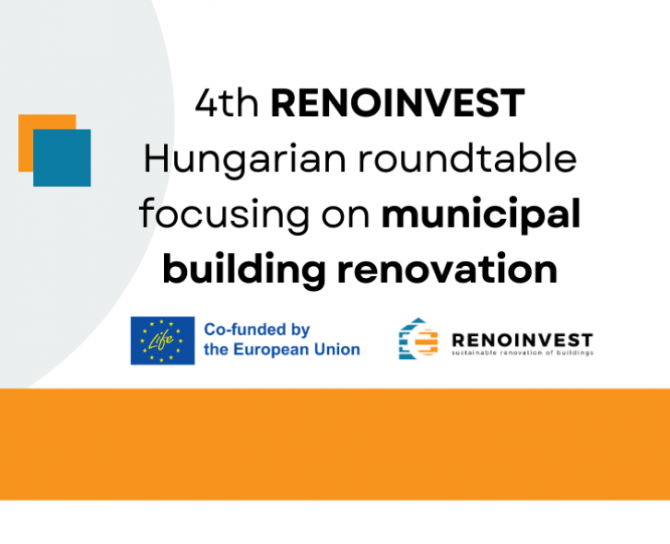
Fourth RENOINVEST Roundtable in Hungary: Municipal Building Renovation for a Sustainable Future
The fourth RENOINVEST Hungarian Roundtable was held on 26 June 2025, focused on the sustainable renovation of municipal and community-owned buildings. Organized online by ÉMI Nonprofit Ltd., together with the Municipality of Alsómocsolád and the Archenerg Cluster, the event also formed part of a joint professional day with the OwnYourSECAP project.
Bringing together municipal leaders, government representatives, financial institutions, and civil society stakeholders, the roundtable created a platform for open dialogue on how to accelerate energy-efficient building renovations, integrate renewable energy solutions, and adopt innovative financing models at the local level.
Why municipal building renovation matters
Municipal buildings—schools, cultural centres, administrative offices, and healthcare facilities—represent a significant share of local energy consumption. Their renovation not only reduces greenhouse gas emissions and operating costs but also:
-
Improves the quality of life for residents,
-
Strengthens energy independence, and
-
Supports the EU’s 2030 climate and energy policy objectives.
The roundtable highlighted that local governments play a pivotal role in the green transition. However, they often face structural challenges, including limited autonomy, restricted borrowing capacity, fragmented funding opportunities, and technical skill shortages.
Key highlights from the programme
EU and national commitments
Örs Ringhoffer (Ministry of Energy) presented Hungary’s obligations under the Energy Performance of Buildings Directive and the Energy Efficiency Directive. These require:
-
Annual reductions of 1.9% in energy use in public institutions, and
-
Renovating 16% of the worst-performing non-residential buildings by 2030.
While these goals are justified, Ringhoffer stressed that they are difficult to achieve under current constraints. Solutions lie in data-driven planning, regulatory adjustments, and dedicated support mechanisms.
Local leadership: The case of Alsómocsolád
Gabriella Zagyva (Municipality of Alsómocsolád) showcased how even a small village of fewer than 300 inhabitants can become a pioneer. Through flexible planning, partnerships, and community involvement, Alsómocsolád successfully implemented climate initiatives such as:
-
Renovating the Autumn Light elderly home (a RENOINVEST best practice),
-
Updating its Sustainable Energy and Climate Action Plan (SECAP),
-
Launching community gardens, renewable energy projects, and local food systems.
The village’s example shows that limited resources need not be a barrier if there is vision, community spirit, and effective use of funding opportunities.
EU funding opportunities
Gábor Vámosi (LENERG Energy Agency) presented practical insights into accessing EU funds. He highlighted:
-
European City Facility (EUCF): supporting municipalities in developing investment concepts,
-
Interreg Danube Region Programme: financing cross-border green transition projects,
-
LIFE Programme: €600 million available for clean energy transition projects,
-
European Energy Communities Facility: €45,000 grants for business plan development.
He stressed that strategic planning and timely preparation are crucial for municipalities to make the most of EU opportunities.
Bank financing frameworks
László Badics (MBH Bank) outlined financing models available for municipalities, including:
-
ESCO-type projects, where savings fund the renovation without municipal debt, and
-
Direct municipal investments, which may offer lower rates but involve more complex administration.
MBH Bank, with 40% of the municipal lending market, signaled strong commitment to supporting sustainable renovation.
Energy communities as a new model
Bence Kovács (Friends of the Earth Hungary – MTVSZ) presented Hungary’s emerging community energy models, where citizens, municipalities, and businesses co-own energy systems. Despite regulatory hurdles, 11 such communities already operate, with momentum growing after the creation of the National Community Energy Provider in 2023. These initiatives represent a democratic, decentralized path to the energy transition.
Roundtable insights
The moderated discussion, led by Ildikó Rajné Adamecz (Archenerg Cluster), provided practical takeaways:
-
Accurate consumption data and digital monitoring are essential for sound investments.
-
Knowledge sharing between municipalities can accelerate replication of successful projects.
-
Regulatory predictability and access to advisory services are critical for long-term planning.
-
Community involvement strengthens local resilience and increases acceptance of renovation projects.
Experts agreed that financing alone is not enough. Progress requires integrated approaches—combining technical expertise, advisory support, and strong professional networks.
Conclusion
The Fourth RENOINVEST Municipal Roundtable clearly demonstrated that the green transition begins at the local level. Municipalities—large and small—hold the key to implementing energy efficiency measures and fostering sustainable communities.
The event also underlined:
-
Ambition is not the problem—implementation is. Goals are achievable if systemic barriers are addressed.
-
Partnerships matter. Collaboration across municipalities, financial institutions, and civil society can unlock solutions.
-
Capacity building is essential. Data-driven planning, professional advisory services, and knowledge-sharing platforms must be strengthened.
-
Every community can contribute. From small villages like Alsómocsolád to larger cities, all can play a pioneering role.
Ultimately, the roundtable reinforced that financial, legal, and technical support must go hand in hand for municipalities to lead Europe’s energy transition. By aligning resources, strategies, and community engagement, sustainable building renovation can become not just a policy requirement, but a driver of resilience, cost savings, and local well-being.
Download below, or click here to read the full summary
The presentation from the event can be found here.
